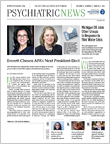When word finally leaks out that your town’s water supply is badly contaminated with a mineral that can poison your child’s brain, you can expect to be rightly angry and worried. And when those effects could be complex and last for years, you might demand some help to understand and cope with them.
On February 5, members of the Michigan Psychiatric Society (MPS) met to discuss its response to the water crisis, said MPS President Vasilis Pozios, M.D., a forensic psychiatrist with the Michigan Department of Corrections.
The lead levels in the Flint water supply rose after the city began drawing water from the Flint River and lead began leaching from the system’s aged pipes.
Lead exposure can produce developmental, cognitive, and behavioral effects, but they can vary widely depending on the level of exposure and on the individual’s response to it, said Pozios in an interview.
“Most of those exposed will be seen initially in primary care,” said Pozios. “We are in discussions with other medical and psychiatric organizations in Michigan to explore ways we can cooperate and be a credible source of information for them.”
Pozios was appreciative of the support the MPS has received from APA’s Committee on the Psychiatric Dimensions of Disasters, which for years has served as a source of information for psychiatrists after manmade or natural tragedies.
“This is the committee’s function—to provide a person to talk to, not just a piece of paper,” said Robert Ursano, M.D., the current chair. “We were at their service.”
The MPS was particularly alert to the importance of psychiatry connecting with primary care, said Ursano in an interview. Physicians should inquire about their patients’—or their patients’ parents’—concerns about exposure and be aware of somatic symptoms of depression.
In a slow-moving disaster like the one in Flint, providing help must be done with care, he noted. The symptoms of lead poisoning often overlap with those of other neurological or behavioral disorders, a fact that must be explained carefully to anxious parents.
“We cannot be dismissive of their legitimate concerns about themselves or their children,” agreed Pozios. “You want to know not only who is exposed but also their expectations surrounding exposure.”
The fears of exposure can be as problematic as exposure itself, said Ursano, recalling studies after the nuclear disaster in Chernobyl, which found that mothers’ reports of their children’s symptoms often were more severe than those recorded by neutral observers.
There’s another lesson to be learned about the Flint disaster, Ursano said. Psychiatrists in other district branches should consult with community leaders, elected officials, and emergency responders about risk communication and ways of maintaining the trust of the public in the event of a community disaster. ■
An article on a related topic, “Japan’s Resilience Eases Impact of Natural Disaster,” can be accessed
here